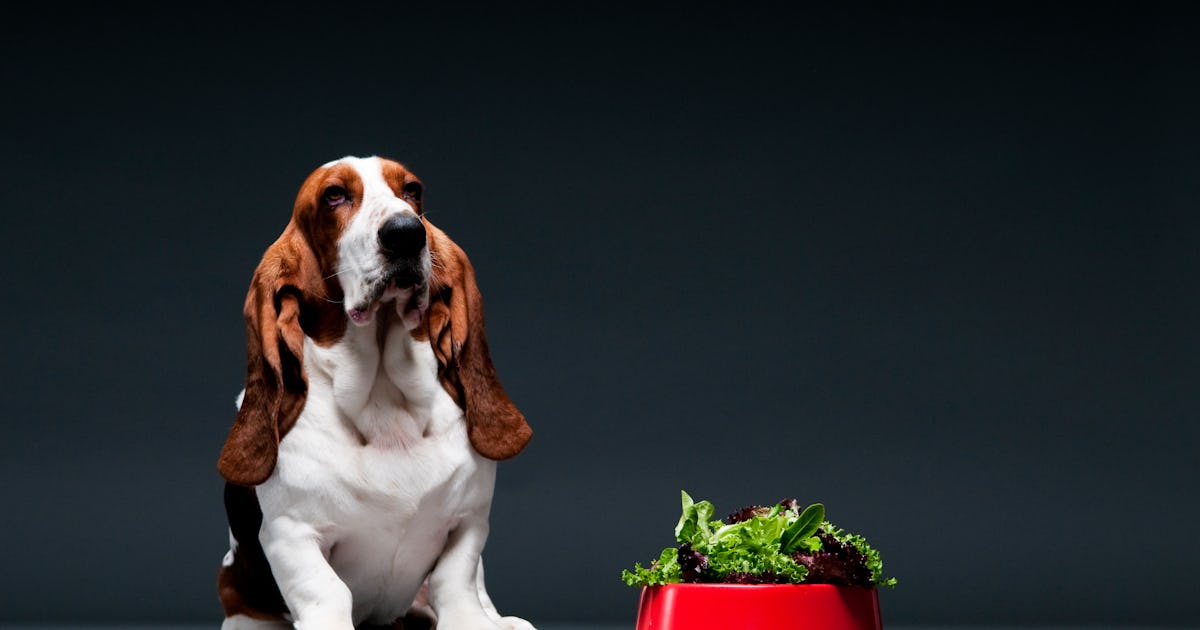Eating more vegetables is one of the fundamental ways us humans can improve our health. But what about that of our favorite pooch? A suite of recent TikTok videos suggest that feeding your dog vegetables is good for their health, even going so far as to say that celery can freshen breath and cucumbers can help boost energy. But is that true? Do dogs need to eat their vegetables like humans do?
“Provided the animal is getting a diet that is complete and balanced, it shouldn’t need any vegetables,” Richard Hill, a veterinary nutrition professor at the University of Florida College of Veterinary Medicine, tells Inverse. Most commercially available dog foods are marked as complete and balanced, meaning they contain all the vitamins, minerals, and nutrients that a dog needs in proper proportions. Hill says there’s “reasonable assurance” that commercially available dog food labeled as complete and balanced is truly complete and balanced.
Hill thinks part of the concern is over ultra-processed food, which has — for good reason — gotten a bad rap for its ill effects on human health. While kibble is technically ultra-processed, it’s fundamentally different from human ultra-processed food, Hill says.
Ultra-processed foods that we eat are typically replete with salt and sugar, and lacking in fiber. Dog food, on the other hand, is specifically balanced and formulated to meet all of a dog’s dietary needs.
Feeding your dog a plethora of vegetables in addition to kibble can throw their diet out of whack, Hill says. Even if vitamins and minerals are good for us, they become harmful in excess. “Everybody thinks that vitamins are always beneficial, but too much is bad for you,” he says.
While dogs don’t need vegetables for nutrition if they are eating their kibble, there may be some benefits to giving your dog a vegetable snack every now and then. Mainly, they can be a healthy and filling treat.
Because vegetables are full of fiber, your dog can stay fuller longer and may even poop more regularly. “We sometimes suggest giving green beans to fill dogs up if they’re over-hungry,” Hill says. He also recommends that pet parents cook vegetables because “they’re more digestible if they’re cooked,” he says.
For a trustworthy list of vegetables your dog can and can’t eat, Hill recommends looking to the American Kennel Club. According to them, dogs are in the clear to eat broccoli, Brussels sprouts, carrots, celery, green beans, store-bought mushrooms (not technically a vegetable), peas, and spinach. They should avoid asparagus, wild mushrooms, avocados and onions.
For pet parents who still want to get their dogs some whole foods, a compromise might be in order. A 2001 article published in the Journal of the American Veterinary Medical Association suggests a blend of a good-quality commercial diet supplemented with fresh fruits and vegetables. These homemade diets can be useful for animals with medical conditions who won’t eat a commercial therapeutic diet. However, feeding a dog only whole vegetables runs the risk of skimping on other essential nutrients.
What’s most important, Hill stresses, is balance. Treats — even veggie treats — shouldn’t comprise more than 5 to 10 percent of your pet’s daily calories, he says. “If you are feeding vegetables, I would say moderation is the thing to think about.”
Credt: Source link

